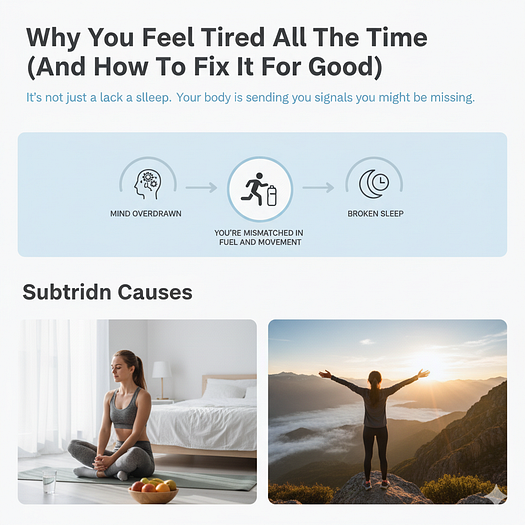Feeling like you’re running on empty, no matter how much you rest? That constant, dragging exhaustion is one of the most common complaints doctors hear. It’s frustrating, often dismissed as “just life,” but the truth is, “tired” isn’t just one thing. It’s a complex signal that something in your life — your body, your mind, or your routine — is out of balance.
You deserve to wake up feeling refreshed and energized, ready to tackle your day. If that feels like a distant dream, this guide is for you.
Here’s a breakdown of the most common reasons you feel tired all the time and, more importantly, how to start fixing it.
😴 Part 1: The “Why” — Common Causes of Deep Fatigue
Your energy level is an intricate equation. These are the factors most likely to throw it off balance and keep you feeling drained.
1. Your Sleep Is Broken (Even If You Get 8 Hours)
It’s not just about the quantity of sleep; it’s critically about the quality. Eight hours of restless, interrupted sleep won’t leave you feeling any better than four.
- Poor Sleep Hygiene: Are you on your phone in bed? Is your room too warm, too bright, or too noisy? These habits disrupt the deep, restorative stages of sleep your body desperately needs.
- Inconsistent Schedule: Your body’s internal clock (circadian rhythm) thrives on routine. A 10 PM bedtime on weekdays and a 3 AM bedtime on weekends sends confusing signals, leading to a state of permanent “social jet lag.”
- Undiagnosed Sleep Apnea: This is a common condition where your breathing briefly stops many times a night. You’ll wake up feeling like you haven’t slept at all, even after a full night’s rest, and often don’t remember waking up.
`
2. You’re Mismatched in Fuel and Movement
Your body is a physical machine, and like any machine, it needs the right fuel and consistent maintenance to run optimally.
- Dehydration: This is a top-tier energy thief. Even mild dehydration can slow down your body’s metabolic processes and make you feel sluggish, foggy, and irritable.
- The Sugar & Caffeine Rollercoaster: Relying on sugary snacks or endless coffee gives you a quick spike followed by an inevitable hard crash. This creates a vicious cycle where you “need” another hit just to feel normal, leading to unstable energy throughout the day.
- A Sedentary Life: The old phrase “energy begets energy” is profoundly true. A body that doesn’t move becomes very efficient at not moving. Your metabolism slows, your circulation dwindles, and your muscles feel “heavy.”
3. Your Mind Is Overdrawn
Your brain, though only about 2% of your body weight, uses a massive amount of your body’s total energy. Mental and emotional exhaustion is just as real, and often more insidious, than physical exhaustion.
- Chronic Stress: When you’re constantly stressed, your body is in a low-grade “fight-or-flight” mode. This floods you with hormones like cortisol, which are designed for short bursts but are incredibly draining when they’re “on” all the time.
- Decision Fatigue: From what to wear to which email to answer, our modern lives are a non-stop series of micro-decisions. Your brain gets tired, just like a muscle, leading to burnout and a feeling of mental fogginess.
- Emotional Burnout: Unresolved conflicts, a job you hate, or relationship stress can feel like carrying a heavy backpack all day. It’s a constant, low-level drain on your emotional and cognitive resources.
4. There’s a Medical Issue
If your lifestyle is dialed in — you’re sleeping well, eating reasonably, and moving your body — and you’re still bone-tired, it’s crucial to look under the hood.
- Vitamin Deficiencies: The most common culprits are Iron (anemia), Vitamin B12, and Vitamin D. These are all essential for creating energy at a cellular level and regulating mood and metabolism.
- Thyroid Problems: Your thyroid is the gas pedal for your entire metabolism. An underactive thyroid (hypothyroidism) is a classic cause of deep, persistent fatigue, cold sensitivity, weight gain, and brain fog.
🛠️ Part 2: The “How to Fix It” — Your Action Plan for More Energy
Don’t try to fix everything at once. That’s a recipe for overwhelm and more fatigue. Pick one or two of these strategies and commit to them for a week. Build from there.
1. Fix Your Sleep First (The Foundation)
This is non-negotiable. Sleep is the foundation of all energy, mood, and cognitive function.
- Create a “Buffer Zone”: Dedicate the 30–60 minutes before bed to a screen-free “wind-down” routine. Read a physical book, do light stretching, meditate, or listen to a calming podcast.
- Get Morning Light: As soon as you wake up, expose yourself to 10–15 minutes of direct (or indirect bright) sunlight. This helps to anchor your circadian rhythm and tells your brain to be alert.
- Keep a Consistent Wake-Up Time: Even on weekends. This is the single most effective way to improve your sleep quality by solidifying your body’s natural rhythm.


.jpg)
.jpg)
0 Comments